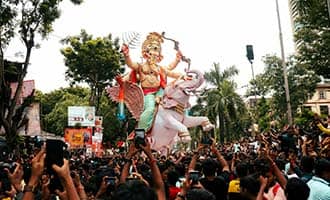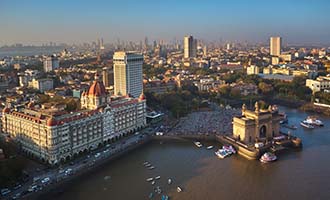Murder and mayhem in a bygone era
Indian historical crime fiction has emerged as one of the most popular genres right now. Here’s a look at some of the books you can read to start your journey into history

Murder at the Mushaira, Raza Mir
Everyone knows of Mirza Ghalib, but could you imagine him as a detective par excellence, solving strange crimes in the heart of old Delhi? If this intrigues you, don’t miss this beautiful book by Raza Mir, an expert on Urdu poetry and a management professor in the US. Every page in this grandly imagined novel evokes vivid images of what Old Delhi was like in 1857, before the first war of independence changed the country forever. It is this revolt that forms the backdrop in this richly woven narrative as Ghalib goes around looking for a murderer at a mushaira.
Death at the Durbar, Arjun Raj Gaind
It’s 1911 in Delhi, and the city is in chaos. A durbar on the cards, the country’s most important royals, dignitaries, and officers along with the elite class are readying themselves for raucous celebration, and a nautch girl is murdered on the durbar grounds days before the event. The dapper Maharaja Sikander Singh of Rajpore is called in to investigate by the King Emperor himself, and as mayhem reigns across Delhi, and indeed all of India, we see through Singh’s eyes the experiences of the poor and oppressed while the powerful crush them. Death at the Durbar is a very interesting read, and a fine look at a country slowly rising in arms through the eyes of a royal.
Smoke and Ashes, Abir Mukherjee
The Scottish-Bengali Mukherjee has seen great success with his Wyndham and Banerjee series of books set in post-World War 1 Calcutta. Smoke and Ashes is his third book, and arguably the best of the lot, based on one of the most gruesome acts the British committed while ruling India — secret experiments on unsuspecting people to develop chemical weapons. Mukherjee’s prose can sometimes be dense, but his desire to team up a British police officer and an Indian sergeant stemmed from a need to illustrate everyday relationships between foreigners and Indians, the lingering effects of colonialism today, and the exchange of cultures and ideas that have built the UK and India as they are today.
The Mistress of Bhatia House, Sujata Massey
Massey created the character of Perveen Mistry, India’s first female lawyer practicing in Bombay, based on Cornelia Sorabji, who actually is India’s first female lawyer. She wanted to pen an alternate history, where Indian women weren’t just seen as oppressed and marginalised, but also as lawyers, doctors, scientists, artists, freedom fighters and spies. Massey has gained a great fan following for her Perveen Mistry books, and she always touches upon universal issues, but The Mistress of Bhatia House is particularly relevant in that it talks about abortion, and how the British abolished it, thus rendering thousands of poor Indian women powerless. The book, set in 1922 Bombay, comes on the heels of the Roe vs Wade controversy in the US, and other countries trying to control reproductive rights for political gain. It’s a must read.
Murder Under a Red Moon, Harini Nagendra
An ecologist by day and mystery writer by night, Nagendra’s Bangalore Detectives Club books set in 1920s Bangalore are cosy and intimate reads, much like Agatha Christie’s Miss Marple books. Kaveri, the protagonist is newly married to a prominent doctor, who is more a partner to her than a product of patriarchy. While trying to help out a cousin, Kaveri stumbles upon a larger conspiracy with time running out. The formula may be a little cliché, but it works as a mystery, but what’s really great about Nagendra’s books is the feminist aspect. At a time when Indian women are fighting for suffrage and greater equality, The Bangalore Detectives Club books offer context but in a rather fun way.
Death of a Lesser God, Vaseem Khan
While most books in this genre are set in the pre-Independence era, Khan wanted to explore India and its turmoil right after Independence. Set in 1950s Mumbai, Khan’s protagonist is Persis Wadia, a brilliant albeit India’s only female police officer. Shunned because no one what to do with her, Wadia is sent to Malabar House, where the have-beens are sent — much like Mick Herron’s Slough House. But while Wadia has proven herself over and over again, in Death of a Lesser God, she is faced with the toughest challenge yet — saving a white man from the gallows for murdering a respected freedom fighter. The plot is riveting, and the stakes are as high as they get. This book’s a winner.
Related
-

Celebrating Ganesh Chaturthi in Mumbai: Accessible and Inclusive Festivities
-

Exploring Wheelchair-Accessible Malls in Mumbai
-

Exploring Accessible Travel Destinations: Your Next Adventure Awaits
-

See the world with ease
-

Don't miss a colourful time!
-

Accessible Adventures: How MobiCrew Makes Everyday Outings Easy
-

Best Places to Explore with Your Companion
-

Creating a Mobility-Friendly Home: Tips for Safety, Comfort, and Accessibility
-

Engaging DIY Activities for Wheelchair Users at Home
-

The weekend movie binge menu
-

Exploring Wheelchair-Accessible Beaches in India
-

Get strong with Tai Chi
-

From Doctor Visits to Movie Night : All the Ways MobiCrew Can Help You Move Freely.
-

From Doctor Visits to Movie Nights: All the Ways MobiCrew Can Help You Move Freely
-

Kerala: A destination for everyone
-

Get out and about
-

Ready, set, go!
-

Travel hacks for the best time
-

Enjoy Mumbai on wheels
-

Eat with ease
-

Exploring Mumbais Best Wheelchair-Friendly Restaurants
-

Accessible Workspaces: Creating Inclusive Offices for All
-

Art Thats Accessible in Mumbai
-

Discover Wheelchair-Accessible Parks and Trails in Mumbai
-

Monsoon Ready: 7 Essentials Every Mobility-Dependent Person Should Carry
-

Around the world on wheels









